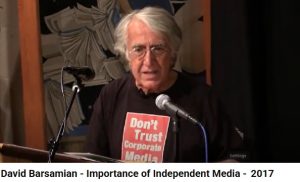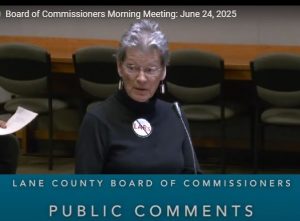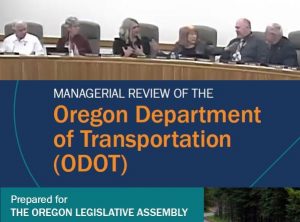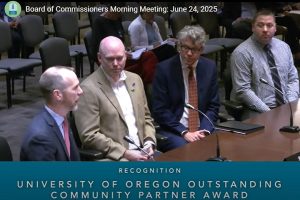Citizens discuss vaccines for teachers, police reform, homeless camps at April 8 legislative town halls
12 min read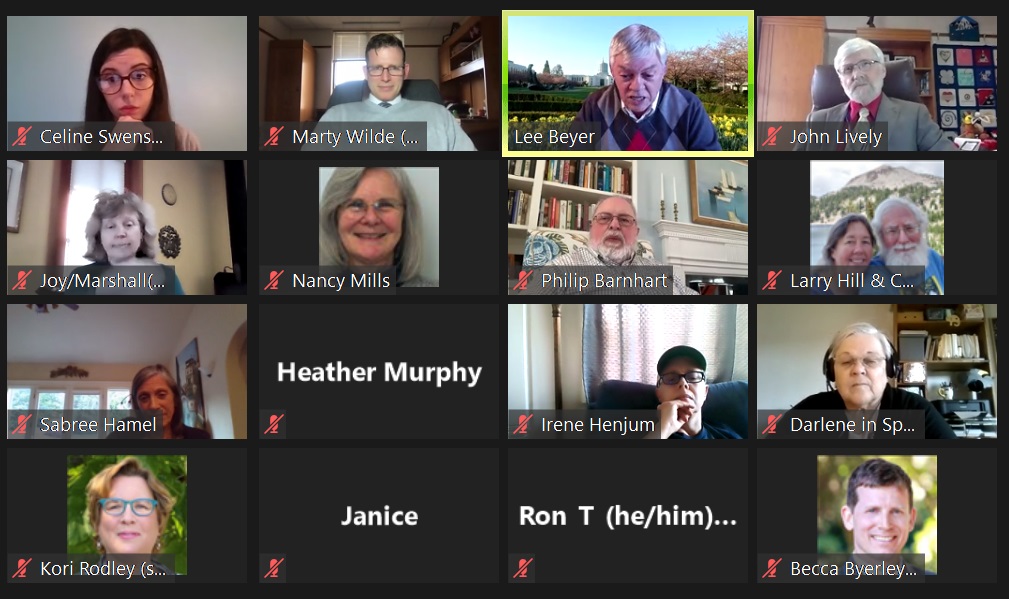
Citizens at two Eugene town halls Apr. 8 asked legislators about a broad range of topics.
Citizens attending Town Halls this week spoke directly with state legislators. One session featured Rep. John Lively, with Celine Swenson moderating the discussion.
Celine Swenson: [00:00:12] The question I have is from Sabree from Springfield. She has two granddaughters who are returning to school next week and is concerned that they’re not old enough yet to receive the COVID-19 vaccine. And the teachers at the school are not required to get the vaccine , and that information is not public. She would like to know your thoughts and if you are concerned about this possibility,
Rep. John Lively: [00:00:35] So, Sen. Beyer and I meet monthly with the school superintendent, others around the school and we’ve been talking about these issues for some time. So first I just want to say that from a teacher standpoint, my understanding is more than 80% of the teachers have been vaccinated, but yes, they have the same rights that the rest of us do, either, not get vaccinated. And it isn’t a public information who is vaccinated or not.
Sabree Hamel: [00:00:59] It’s important to me because those kids all have on records, every vaccination they’ve ever had since being given the privilege to go to school. I’m not sure why a teacher would have to do less than that. I don’t know that COVID vaccines will be required once they’re available for kids, but if they’re required for kids, can’t we make it a requirement for our teachers?
Sen. Lee Beyer: [00:01:33] Let me address two points there. One, at this point they are not required of kids. And the second point is under the federal law, they cannot be required to take a vaccine.
Thank you for supporting
local civic journalism
Rep. Marty Wilde: [00:01:45] The reason you can’t require them, is there all the vaccines right now on what’s called an emergency use authorization. So the paperwork that you have to sign and says, this is voluntary, you don’t have to take it I, I definitely hear your concern. I’ve supported all the school districts in offering online options for kids. I guess what I can hopefully tell you to reassure you is the data at least on Pfizer is out for the 12- to 15-year-olds, which usually means that the emergency use authorization from the FDA will follow relatively quickly, probably in the next few weeks. As Lee mentioned, we had 10 different school districts and they’re all doing slightly different things. I think the goal for everybody is to go back full-time in-person next fall.
Celine Swenson: [00:02:24] Can you share your perspective on law enforcement bills that are in process now? Specifically, what will they accomplish and what still remains to be done to address transparency and accountability in law enforcement?
Rep. Marty Wilde: [00:02:35] I’m on the Equitable Policing Subcommittee. We have bills that address the full spectrum from selection all the way through termination of an officer. It is everything from background checks that include associations with known racist organizations or violent organizations in the hiring process to improve training on racial equity at the police basic course to protecting free speech rights for protesters and operations to Having databases of police officers who have committed misconduct that are accessible to the public to reforming the processes for disciplining officers to make sure that they’re fair and appropriate for everyone.
Being a police officer, once we get through this tough time, is going to be a much better profession because we’re going to, frankly, be getting the people out who have made life difficult for their officers who are trying to do the right thing.
Celine Swenson: [00:03:23] We have a question regarding housing and houselessness. Oregon’s small cities are being overwhelmed by climate change and economic refugees. What kind of help can Eugene and small cities expect to see from this year’s legislature, in terms of housing issues.
Rep. Marty Wilde: [00:03:41] We have actually already spent money for the Navigation Center in Eugene as well as basic shelter. We also recently passed on the House side an authorization on a wide bipartisan margin for what we call ‘Super Siting Authority’ for more shelter. We’re trying to take care of the most exigent circumstances first. I think there will be more money coming on that as well. We also passed foreclosure relief and property tax relief. The longer issues are likely to take longer.
So one of the things about the federal money is you have to spend it with a certain period of time, so we were trying to figure out, which would preclude like large, low income housing projects, for instance. I’ve been working with the manufactured housing industry because that’s the way we could spend a bunch of money. And house a lot of people, or house a lot of people better.
So for instance, there is a property in on Franklin Boulevard in Glenwood that is basically a vacant mobile home park with all this labs and utilities set up. If we do fund that mobile home acquisition, you can put mobile homes up there. You could purchase that and put mobile homes up there right away. The longer term stuff, I’m a big believer in the, what we call the ‘House Bill 2003 process,’ which sets needs, it determines needs and projected needs and areas, and then requires cities and counties to have a plan for meeting that housing need.
And so that’s the—I’ve been fairly deferential to the cities as to how to do it, but I think that they need to do it is something that we need to work on and showing them that. So that process is ongoing. They are doing the inventories now, and I think we’ll see some results in the long-term, but, so I think we are going to spend a lot of money and I think we have, done some streamlining on the policy side as well, to help get there.
Sen. Lee Beyer: [00:05:18] The comment that I’ve made to the Senate leadership, this is one-time money. This is one time when we could, without creating an additional man, invest more heavily in housing of all types, but particularly for transitional housing, like the Pallet Houses. I know that we have just an incredible deficit of housing for people with mental issues, particularly substance abuse. And if we could invest in that, we probably could save and defer expenditures in the future on services to these people. But it’s a challenge to do that. It’s hard to do. And I hope that we have a chance to do this time.
Lane County, I think, and the City of Eugene have done a pretty good job of trying to deal with some of that. We they’ve had quite a bit of housing investments, but certainly, if you look around at, I call them the blue tents. In fact, we had a fire under one of the overpasses the other day. That’s not a right way to treat our fellow human beings. And we’ve got to be able to deal with that in a compassionate way. And this is one time when we may have money to do that. And I hope we find a way to do more of that rather than other really nice projects, but maybe not as important in the human sense.
Rep. John Lively: [00:06:41] Rep. Wilde already talked about manufactured housing. We could go in and put up a whole bunch of manufactured housing as much quicker than you can build stick-built houses. In some cases, the tiny homes, 800 or less square feet in it. So that was there, all the range of things that are being talked about, especially with this money, that might be one time money, but what we realized in communities, because the restriction of land being available, utilities and things, we just have to think broader on how, what types of opportunities we can provide in housing and how quickly we can provide that.
Celine Swenson: [00:07:10] The question is how do we build consensus for quick action on climate related issues? And are there common concerns?
Sen. Lee Beyer: [00:07:22] We probably don’t build consensus because many of our opponents don’t agree on that, but we are making progress towards reducing carbon emissions. We’ve done quite a bit in terms of encouraging electric vehicles. We required the state fleet, each new purchasing cycle, at least 25% of the cars they buy have to be EVs. And Rep. Barnhart when he was there, passed some major legislation to make sure that people who live in apartment buildings or condominiums could get chargers installed .
Rep. Marty Wilde: [00:07:59] We just passed a tax bill, 2027, which will get the state fleet with a goal of a hundred percent by 2025. That’s great. The governor’s bill 2165 would increase incentives for people to purchase EVs. 2290 will provide for more fast charging for those longer trips, largely in parks. And then as Lee mentioned, 2180 increases charging capacity and new construction as well. So stuff there to help people get into EVs.
Sen. Lee Beyer: [00:08:23] While we didn’t pass cap and trade last time, Gov. Brown has taken significant action through executive order to promote changes to address a lot of that. We’re looking at things in terms of energy efficiency standards, Reach codes, providing opportunities for local governments to go farther faster if they want to.
John Quetzalcoatl Murray: [00:08:47] Another Town Hall featured Sen. James Manning, who announced Senate Bill 5.
Sen. James Manning: [00:08:53] It was a really interesting day in the Capitol. We, our Senate president and I, have introduced a bill, Senate Bill 5. And what this bill is, that it creates a pathway for student-athletes to reap some of the benefits, some of the royalty benefits of their hard labor that they have putting out and pretty interesting conversations. Here in Eugene, I talked to Allan [Benavides], the general manager of the Emeralds. They have to build a new stadium or the San Francisco Giants will probably move them to a different location. I think baseball’s important for our area. I think it’s something that’s going to grow and they are looking for a new stadium and so I put in a request for $38 million for them.
John Quetzalcoatl Murray: [00:09:45] Steve asked Sen. Manning if the Ems could share a field with the Ducks.
Steve: [00:09:50] The Emeralds shared a stadium with U of O for quite a while. Now they’re going to play more games, theoretically, why can’t they still share? It’s not like it’s too small a stadium. It seems quite an adequate stadium for the Emeralds. Is sharing a problem or, is there just a logistical difficulty?
Sen. James Manning: [00:10:10] When I talked to the GM, sharing is a problem. One, that they try to schedule their games when the Ducks are away so they play their games there, but the Ducks have players that are still back and then either use the field and use equipment and things like that.
So it makes it very uncomfortable when you have a change like this, not to mention the fact is that the Ems have been elevated. I think now they’re like Triple A team. They need to have their own facility so that they can run it and then it’s another option of what they can do in terms of public events that you’re going to hold there, concerts and all these other things. So it will be something that is just more than just a pro baseball team.
And that, and then you did mention that they’re going to have more games as well. I am a little concerned because that the $38 million for the Emeralds and stuff is really important to me as it is important to Eugene, I want to make sure we get that, but there are probably some other ways we can do that, through bonding and some other combination.
Emily Keizer: [00:11:11] Morley Hegstrom asks, Did you say you requested funding for Hayward Field Olympic Trials?
Sen. James Manning: [00:11:18] Yes. I spoke with the governor and she’s asked for 10 million and I’ve already expressed that with the Senate president along with the the 38 million for the Eugene emeralds the city of Eugene has some other asks that are in there. I’m hoping that smaller numbers will probably get funded. The larger numbers probably have to go through some type of a bonding or a combination of so we’ll have to see.
John Quetzalcoatl Murray: [00:11:45] Sen. Manning addressed the growing number of homeless people in Eugene.
Sen. James Manning: [00:11:50] I’m asking all of the cities and other municipalities look at some of those codes and laws that they have on books because by making sure that we update these these laws that we have and make them use them so that only the ones that are really practical and applicable to law enforcement arer the ones that they actually need and not just going out and harassing people in these these homeless camps.
I did speak with Chief Skinner and he told me that that’s not what his officers are expected to do, and if they are doing it, he will want to know about it because that’s a waste of time. And then again, you can’t arrest anybody that doesn’t have any ability to pay. And then what are you going to do? Where are you going to put them? You want to put them right back out on the street? So why don’t we start concentrating on getting some shelter for these folks, and help them get up off the street and get them started on a different path.
So I think it was 2011. Kitty Piercy was mayor at the time she asked me when they put together a task force on homelessness and I was a member of that. We went and looked at homelessness that was existing then. It wasn’t as bad then as it is now from what I see.
And I looked at it in a couple of ways: One, we can’t lump all of them in the same group because we do have people that are homeless due to no fault of their own: fell upon hard times or maybe a natural disaster put them on bad times. Then we have some that are actually maybe dealing with substance abuse issues, things like that. And then we have a group that really don’t want it. They just want to be left alone. They want to live out and what they don’t do, that group is going to be much harder to deal with.
But what I am amazed at is that as I see these campsites growing and growing, I do know that the problem is very serious. It’s extremely serious. And we had to put more money into trying to do, providing adequate, I don’t want to just have a hut or anything like that. They have to have a place where they can regain their self-esteem, dignity, and respect. So building more, we’ve talked with St. Vinnie’s, who’s good at why Homes For Good, all these, the find out, if we give you more money to build some of these places, then what can how fast can we make it happen?
I’m on the Project Turnkey and that’s we provided funding where it was, the, oh, a Red Lions Hotel so that they can convert those into transient living spaces. They’re going to be putting kitchens in there and other things, stuff to make sure that those apartments are there. People will be able to move in until they are able to help them with stable continuous living places. So that’s part of it. There are other efforts that are going out, but it seems each time we put forth a little effort, the situation gets gravely worse. So we’ve tried to play catch up with a situation that I don’t really understand how to get a handle on it with the small amount of money that we have and it’s very frustrating and heartbreaking for me as well.
